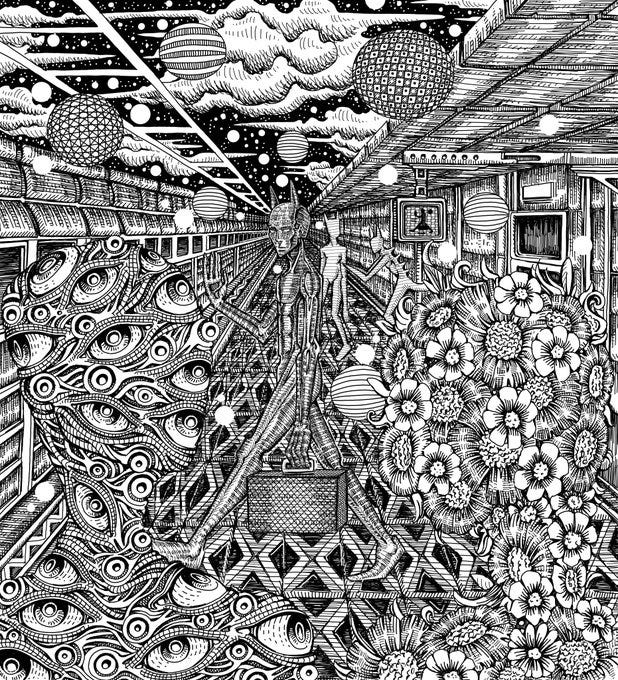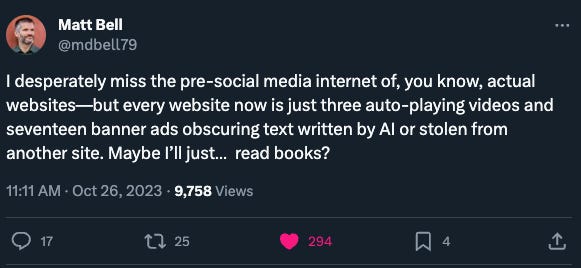Toss the Link Salads? Or Eat Them?
The case for human curators.
“To be gathered, it must first be scattered.”
– Laozi’s Dao De Jing: A Plain Translation, by Ken Lui
Hello! Today, I’m going to further discuss human algorithms, and explore how we spread and navigate the Internet, which I began to interrogate in my essay, Should We Still Send Links to Friends? But first, thank you so much to the folks who signed up to be advanced Reading Raccoons for my new novel Acid Christmas! Love you! You should have all gotten your advanced ebook by now, and I can’t wait to hear your thoughts.
I’ve also just received proof copies of the paperback! Yay! Goodies and signed books go out to paid subscribers to this Lagoon after the book is released on Nov 15th. Details on these special packages coming soon in a separate email.
And second, I don’t know about y’all, but my Stolen Focus Fall Challenge isn’t going well. I find myself sucked into the disaster news BAD. This makes the following essay even more relevant to me, because as the wars around the world escalate, we find ourselves in mini-battles with social media, trying to prevent ourselves from seeing unwanted, horrific images or fake news.
So perhaps human content distributers are the way to go, versus relying on machines to distribute information. Hence, I will now explore the benefits of what I call “Link Salads.”
“In word salad, alas, drown I.”
— a palindrome by Win Emmons from The Wit’s Guide to Palindromes
What is a Link Salad?
Many online writers and artists share pages of links, quotes, and images with their audience. I don’t mean blog posts, single link tweets, or sharing reels, but an entire gathering of multiple sources, a listicle of pieces, a roundup of essays or videos, a sorted human-created feed.
I call these gatherings or URLs/Videos/Images—Link Salads. They don’t have a clear thesis; they are an assortment by nature. It’s a petite museum, a bit of this, a dash of that.
Link Salads are like the mixed tapes of the ‘90s that your friends made you (if you were alive back then), but they’re mixed link pages that creative catalogers make.
I used to be a little down on these conglomerations, thinking machines could do it better, but the more the machines don’t do it better, the more I want the internet to be like ‘the good ole days’ when people visited actual web pages instead of social apps. So, as I get older, I appreciate these offerings more.
And I’m not alone in this feeling.
Some of these are free buffets and others charge for their salads. Perhaps one of Substack’s greatest features is its preferential treatment of these human curators vs machine ones.
These are also different from sending links to friends as they are more constructed and thought out, more crafted than the quick texts or dms of content we often share with friends.
Do you already consume such sources? Tell me your favorite human curators in the comments and I’m going to share some examples here as well.
The Salad Bar

Raspberry Vignettes
Freya Rohn makes my favorite Link Salads. She shares a digital version of her commonplace book, a log of what resonates with her from poems to essays to art. Like this gem, she shared recently about the last real newspaper in America:
“Once the paper is removed, you can hold it in your hands, fold it into quarters, and read it on your porch on a sunny afternoon accompanied by your favorite cup of coffee, cigarette, or can of beer.” A newspaper that you can only read on paper, never the internet.
Spicy Chopped Audacity
For fewer aesthetics and more hard-hitting pieces, acclaimed author Roxanne Gay also shares weekly link salads as part of her Substack, The Audacity. She calls them “Roundups.”
Gay describes why she does this:
“People curate what they put from their lives into the public sphere, but a good writer makes what they curate one hell of a story.”
Solid justification if there ever was one.
Thousand Utopian Island
Elle Griffen of The Elysian adds link salads at the end of her essays like a bibliography for people who want to examine her research source materials. Her links are more thematic and centered around utopian futures vs. being a random assortment like Gay’s or Rohn’s.
Farmhouse Craft
Likewise, Monday Monday a publication out of rural Michigan by quilt maker Marlee Grace does more of a side salad, where they put a few things they’re “Paying attention to” at the end of posts. Monday Monday also adds pictures, which I think makes the salads yummier to digest.
Zesty Hungarian
The Hungarian founder of the global literary salon organization Interintellect, Anna Gát releases a weekly digest called What to Read This Weekend, where she shares links and quotes to everything she read and liked that week. It’s rich with essays you probably wouldn’t find on your own, some new and some older.
Balsamic Futures
Finally, the popular futurism publication Max charges $7 per month (or $70 per year) for weekly link salads in addition to their other posts, and what to read and what to watch sections. The publication is very open-concept and can range from sharing the best Japanese movies to the best articles on the FTX scandal.
Wait, but isn’t this just more distraction?
Hey, didn’t you say that if we’re already distracted? If we’re already overwhelmed by social media, shouldn’t we just get off the internet?
Maybe, but the thing with human curation and long-form online essays, books, and art that these salads often share is that they aren’t designed to hype up your brain and addict you to the app. They don’t make you swipe in different directions. They make you sink in. Concentrate. Focus.
Plus, we like being online. We like learning and reading, and this is a slightly less distractible format, a less frenetic way to engage with the pleasure of the internet.
Of course, one could still go down rabbit holes, still be radicalized, and still be wasting time, but engaging with these human curators is probably better than locking your eyes on TikTok for an hour.
Furthermore, we have a long history with human curators that predates the Internet and social media.
The Hipsters
Before The Algos, we had hipsters to curate for us.
Writer Sam Kriss writing in his newsletter Numb at the Lodge outlined this and the role of hipsters in his essay called "All the Nerds are Dead,” where he laid out the rise and demise of the hipster era.
“The hipster was an information-sorting algorithm: its job was to always have good taste. The hipster listened to bands you’d never heard of. The hipster drank beers brewed by Paraguayan Jesuits in the 1750s… The hipster swam deep into the vastness of human data, and always surfaced with pearls...”
That was the theory, at least. In fact, the hipsters were generally very bad at their job. Most of the stuff they liked was awful.
But not all hipsters were bad at it. Some were great. Some became magazine editors, changemakers, and icons of taste.
Kriss also writes that we genocided the hipsters a decade ago because it became impossible for any human to swim the depths of the massive internet.
Yet we keep trying, and we must. We need the human touch, and the hipster curation urge is as innate in some of us as gathering strawberries.
Nerds vs Hipsters
Scott Alexander of Astral Codex Tenalso wrote about the withering hipster in a response essay to Kriss:
“My theory is: hipsterism and nerdism are both forms of trying to invest your identity in a cultural product. If there’s no competition, you become a hipster; if there’s high competition, you become a nerd.”
At present, there is very high competition because everyone has a phone containing the most sophisticated curation machines ever known. It follows that the hipsters became nerds, and nerds make the best curators. They search, find, and organize things for the rest of us. They trek passionately through the weeds of the Internet to find superior ingredients for our salads.
The Care

Humans also sense better than machines what touches us the most. We can find within our niches that which resonates but doesn’t disturb or infuriate the masses.
I’ll leave you with inspiring words from author Russell Nohelty on the key to good curation:
The key to curation is care; an almost single-minded dedication to surfacing what your audience needs to hear and what will enhance their lives… I see a lot of people who do roundups b/c it’s the thing to do, but they don’t understand that curation has very little about what you like (though that is part of it). It has everything to do with what will enrich your reader’s experience inside your publication.
Like everything else, it’s all about them. There are hundreds of articles I read a week that I enjoy, but I won’t put in a roundup.
The perfect articles are the overlap between what you love and what you think your audience will love.
I don’t think the machines are there yet in terms of care. So, I challenge you to find a human source for your next “feed” and embrace munching on Link Salads instead of IG reels.
Not only will you discover new things the algorithms may never show you, but you’ll also get to know a real person—the sorter, the curator.
Now You
Link salads: yes or no? And why?
And who are your favorite human sorting algorithms?
That’s all!
Ciao for now.
XXXOOO





I like occasional link salad, but unlike my lunch salads, I try to limit the ingredient list to 5 or so. And I like what Matt Bell said.
I so feel this, they can really be hit or miss for me! There are some I read, but most I ignore. I'm glad mine have been interesting though! 🥰